Feast of All Saints Read online
Page 2
But one thing was sure, that at sixteen he had run away to Egypt, wandered through Greece and returned to Paris in the company of a wealthy Englishman, white of course, to become an artist. He’d written of these exotic lands, Monsieur Philippe had an article somewhere sent home by his young brother-in-law, Vincent, where was it (what Marcel wouldn’t have given to lay hands on it). But back to those times when he was wandering, and slaves over the back fence said the old Haitian, now bedridden, had disowned him. What claim had he over that beautiful Juliet, who could imagine? She with that pale golden skin and delicate face…but Philippe merely touched on that lightly, she had died on the vine. Cecile nodded.
And they said she drank sherry and fell to merely watching the rain.
And that she was mean to the old Haitian in the last year of his life, yes, Cecile had heard that too, when paralyzed he had to lie there to be fed softboiled egg with a spoon. The blinds were shut forever. Children of five and six thought the house haunted and loved to run past it squealing. Ah, look at it now, a jungle behind those cracked brick walls, and a peeling hulk on the busy corner.
But at just this time, across the sea, Christophe’s star rose.
Marcel could remember the rest.
And long after Monsieur Philippe had let the tale drop, he traced the thread in his own memory—how people had gathered to watch the old man’s casket come out because of the son’s fame. And only when it was all over, and a ghastly, worn Juliet walked back from the cemetery in the scorching sun, did people begin to whisper the truth. It was on the tombstone. The old Haitian had been her father!
So didn’t he have some rights over the boy, his own grandson?
But what would she do now, take lovers? Get new servants for those sold off or dead, patch the walls, bring the drapers and painters up the steps? No one doubted she could do it. She was so-o-o-o lovely still, Marcel at twelve was mad to get a glimpse of her. He didn’t really understand about Christophe then. He was “in love” with something or someone else. It did not come to him as having meaning yet that a famous man had lived there, walked there, breathed there.
And she did nothing. Her windows crusted with dirt, her garden wall became a menace. The vines that pushed it out miraculously held it up. She did not answer notes or knocks, and soon the hatred commenced. It was unfair! Christophe’s Nuits de Charlotte stood open in the windows of the booksellers. Stupid, silly…but most of all unfair.
How wonderful it would have been, after all, to “receive” her and hear about the young man firsthand, be her friend. But she became a witch in time, her lone-ness not only absurd but unfathomable. How, after all, could she endure it? The last of her slaves was put to rest in the Old St. Louis. The house was empty save for the cats.
Pity went fast, however, for she was too vicious if you spoke to her on the street, turning away at once, her head bowed, her cat in the basket on her arm. And with her son’s fame, increased the hatred.
But the boys Marcel’s age were now on fire for Christophe. They worshiped him, and sternly forbidden to go near his mother they nevertheless lingered at her gate, hoping to put but one question, and always in vain. If she came out at all, they scattered. She looked too dreadful with her diamond rings in the noonday sun, an inch of petticoat beneath her hem. The mailman brought her letters from France, they got that out of him, but did she even pick them up from the gravel path? Straining to see through a chink in the wood, they had the worst fears.
But she was Christophe’s mother after all. They couldn’t despise her out of loyalty, and they had other things on their minds. Like writing stories in his “style,” making scrapbooks of clippings sent home by older brothers, uncles, cousins. And lounging about in each others’ parlors on afternoons when adults were out, they dreamed aloud with pilfered brandy of the day they would make the fabled pilgrimage to Paris, might knock on his black lacquered door on the Ile Saint-Louis and reverently, politely, gently, unimposingly, hand him their sheaf of manuscript pages.
Occasionally there was an uncle or a brother home who had, in fact, drunk with him in some crowded café, and then the rumors went wild.
He smoked hashish, talked in riddles, could be seen quarreling in the street, and staying drunk for twenty-four hours at a stretch, he talked to himself, and sometimes fell into a stupor at a café table. And there would appear that Englishman, “white of course,” who would pick him up, slap his face gently with a few drops of water, and slinging Christophe’s arm over his shoulder, carry him home.
But he was kind to his countrymen always. He never read stories shoved at him across tables, but gave gentle general advice, and when a tactful introduction here or there could be effected, did that with grace. He showed no shame of race, clasped dark hands, asked about New Orleans, and certainly seemed to listen. But he was quick to be bored, to grow silent and then be gone. You clanged his bell in vain after that. He knew when he had done all he could and you had nothing to offer.
Ah, admire him if you will, but imitate him never, said the parents to the enamored children. Marcel worshiped him, and those who watched his recent wanderings wondered if it were some mad emulating of the famous man that sent Marcel off the track.
For Christophe set the other boys on the straight and narrow when they thought of him. They wanted the tools to be like him, and in the scattered private schools around the town, here under a white teacher, there under a colored, they strove tensely, the lessons expensive, the classes select. They must be educated when they stepped off that boat, they had to be men.
And that Marcel would make the journey to Paris, that he would have his chance—all that was certain. A promise made by Monsieur Philippe at his birth was the guarantee. And sooner or later, at least once a year, that promise was reiterated. Cecile saw to that. She had no concern for her daughter Marie, she said, Marie would “do well.” Lips pressed tight, she dismissed that subject abruptly. But in the warmest and best moments would broach the matter of her son. Marcel, lying awake on smothering summer nights when the mosquito netting, gleaming gold in the faint spluttering nightlight, became the only walls dividing them, would hear Monsieur Philippe murmur on the pillow, “I’ll send the boy in style…” It was a vintage promise, a part of life. So why not work toward it?
But Marcel daydreamed in class, provoked the teacher with obscure questions, and the sight of his empty chair a dozen times in the last month filled everyone with a vague dread. He was too well liked for the other boys to enjoy it. And his best friend, Richard Lermontant, seemed rather miserable. But what made this fall from grace all the more confusing, especially to Richard, was that Marcel himself seemed not the least confused by it. He was hardly helpless in the face of youthful passion. He did not, for instance, court his sister’s pretty friends and then, giggling, yank their hair. Nor did he pound his fist on tree trunks declaring, “I don’t know what got into me!” And never once, in a welter of confusion, did he call on God to explain how he could make the races different colors, or demand an explanation for why the world was cruel.
Rather he seemed privy to some terrible secret that set him apart, and bound to calmly pursue his course.
Which this morning seemed hell-bent for disaster.
It was a warm summer day, and he had only caught his breath as he drew closer and closer to the volatile Juliet when she stopped at the fruit stands beneath the arcade. And putting his left hand up against the slender iron post in front of him, he pressed his lips against his hand and gazed at her with wide blue eyes. He did not realize it, but he seemed to want to hide behind the colonette, as if such a narrow thing could hide him, and he had covered all of his face except his eyes.
There was pain in his eyes, but the kind that reveals itself in a flicker, the puckering of the eyelid underneath, a flinching at one’s own thoughts. Looking at Juliet, he knew full well what he was expected to see, and understood full well what he, in fact, perceived. Not squalor and wickedness but some radiant and splendid spectacle of negle
ct that laid his heart waste. But this had been today a matter of glimpses.…
Running breathless to her gate from school, he’d pounded on it for the first time in his life, only to be told by a shouting neighbor that she’d gone to market. But he’d caught the first sight of her only a block away. And she was tall and he could trace her easily.
Now, when the flock of bonneted women broke between them, and she stepped out again into the cobblestone street, he saw her clearly for the first time.
He started, all of a piece, like a man jumping to the clang of a bell, and moved as if he might go up to her. Then he lapsed back, lips pressed again to the back of his hand, as she made her way under the clear sun to the iron fence of the square. He seemed lost to her in every detail and silently shuddered.
She was slow if not languid as she walked, her market basket riding gently on her arm, and as he had seen her a thousand times, fantastical, her frayed shawl a blaze of peacocks and silver against her red silk dress, flounces torn and dragging the stones, her fine brunette hair falling in hopeless tangles from the grip of a pearl comb. Diamonds sparkled on the fingers of her right hand with which she gathered her skirts at the curb, and as she turned toward the long row of sketches for sale on the pickets, Marcel could see her profile for an instant and the flash of the gold loop in her ear.
Suddenly, a great lumbering hack rattled by, obliterating her, and maddened, he darted across the street behind it, coming to a slapping halt so that she turned around.
Someone called his name. He didn’t hear it, but then he did, and couldn’t remember it. She was looking at him, and he had lapsed again into the utter passivity of a staring child.
Only a yard stood between them. It seemed in years he had never been so close to her, her amber face as smooth as a girl’s, deepset black eyes fringed with lashes, the high smooth expanse of her forehead broken by a widow’s peak from which her hair grew back in lustrous waves. She was mildly curious as she looked at him. Then, her thin rouged lips drew back into the curve of her cheek and the supple flesh around her eyes was etched with fine lines as she smiled.
A tiny heart pounded in Marcel’s temple. Someone brushed his shoulder, yet he didn’t move. Someone said his name.
But suddenly as if something had distracted her Juliet bowed her head, tilting it strangely to one side and groped with her fingers in her hair. She was searching for the comb as though it had begun to hurt her. And as she jerked it out and looked at it, all of her black hair fell down over her shoulders in a cascade.
A soft excited sound escaped Marcel’s lips. Someone had a hold on his arm, but he merely flinched, stiffened, and let his eyes grow wide again, ignoring the young man at his side.
All he could feel was the pounding of his own heart and he had the distinct impression that the rush of horses and wheels in the street had become deafening. There was shouting somewhere, and from the riverfront before him came those echoing booms from the unloading ships. But he saw none of this. He was seeing only Juliet, though not right now. Rather it was another time, long long ago, before he was the villain he had become of late, the outcast. But it was a time so palpable that whenever it came back to him, it engulfed him and was memory no longer, but pure sensation. His tongue pressed against his teeth and he felt flushed and stunned. He might even be sick. And just for a moment he didn’t know for certain where he was, which might lead to terror. But groping for a hold, he found the memory which was a spell.
Running home years ago, he’d stubbed his boot on a fallen lump of coal in the street and been thrown right into her arms. In fact he’d pushed her backwards as he gripped the taffeta of her soft waist and then seeing it was she, Juliet, let go in such panic he would have fallen if she hadn’t clasped his shoulder. Looking up into her eyes like beads of jet, he saw the buttons all undone from her throat, and the mound of her naked breast pushed against the placket of shimmering cloth. There was a darkness there beneath the undercurve where he could see the soft meeting of chest and bosom. And an alien surge had made him shudder. He had felt her thumb against his cheek like sealskin, and then the open palm of her hand rubbing gently back and forth, back and forth against his tight curly hair. Her eyes seemed blind then. Her fine small waist was flesh beneath the cloth only, an astonishing nakedness. And the scent of spice and flowers lingered afterwards on his hands. He almost died.
He was almost dying now. And then and now, he watched baffled, weak, as she moved away from him like a tall ship, upstream.
“But this has nothing to do with it!” he whispered, the shame burning in his cheeks, unable to keep his lips from moving (he was a great one for talking right out loud to himself, and was forever relieved when others, coming upon him unawares assumed he had been singing). “It’s Christophe,” he went on. “I have to talk to her about Christophe!”
But the mere vision of her swaying skirts was stunning him again and he murmured in French out loud with a melodramatic air, “I am a criminal,” and felt some mild relief at being the abject object of his own condemnation. Too many nights had he indulged himself thinking of that chance childhood collision—the naked breast, uncorseted waist, wild perfume—so that now he had to draw himself up like a gentleman who, having glimpsed an unclad lady at her bath, shuts the door and quickly walks away.
This was the Place d’Armes, someone was trying to break his arm.
He stared astonished at the breast buttons of Richard Lermontant, his best friend.
“No, go on Richard,” he said quickly as if they’d been arguing all the while, “go on back to school,” and craning his neck to see Juliet disappear in the throng at the market, tried to wrench himself free.
“You are telling me to go back to school?” demanded Richard, holding him fast. His voice was low and deep, all but a whisper on the word of emphasis. “Marcel, look at me!” It was always Richard’s habit to lower his voice precisely at that point where others raise theirs, and it was invariably effective, perhaps because he was so tall. He towered over Marcel, though he was only sixteen. In fact, he towered over everyone in the street. “Monsieur De Latte’s furious!” he confided, drawing close. “You’ve got to come back with me now.”
“No!” Marcel said shortly, and lurched forward freeing himself and stifling the urge to rub the upper part of his arm. Seldom in his life had he been touched except in anger, and he had a healthy distrust of being held, loathing it in fact, though it was impossible for him to loathe Richard. They were more than friends, and he simply couldn’t bear to be angry with Richard or to have Richard angry with him. “Be a good friend to me,” he turned pleading, “and go. I don’t care what you tell Monsieur De Latte. Tell him anything.” And he started off fast for the corner.
Richard overtook him quickly.
“But why are you doing this? What’s the point of it?” he pleaded, his shoulders slightly bent so he could be near Marcel’s ear. “You ran out in the middle of class, do you realize what you’ve done?”
“Yes, I realize it. I did it, I did it,” Marcel said, blundering into the traffic of riverfront street, so that he was at once forced back on the curb. “But let me go please.” He could just make out the top of Juliet’s head at the fish market. “Give up on me, please!”
Richard let him go, and clasping his hands behind his back he gained at once what seemed a characteristic composure so that nothing of the sixteen-year-old boy was left in him. In fact he had an ageless look most of the time so that strangers might think him twenty, perhaps older. He had never asked for his height, in fact, had prayed against it, but a manly spirit had some time ago invaded his long limbs; and as he stood very still with one foot forward, and his shoulders only a little bent, his lean face with its prominent cheekbones and slanting black eyes made him appear at once majestic and exotic. He was darker than Marcel, all of an olive complexion, his hair wavy and black. But this suggested the Turk, the Spaniard perhaps, or even the Italian, and almost nothing of the French and the Senegalese from whom he was
descended.
Gesturing with a languid hand, fingers sloping gracefully from the wrist, he whispered. “You have to come back, Marcel, you have to!” But Marcel was looking toward the market again where a great flock of birds rose suddenly from the tiled roof, looping and descending on the masts above the dock. His eyes narrowed. Juliet had emerged from the crowd feeding fish on her fingers to her cat.
Startled, Richard said, “You aren’t following her!”
An involuntary look of distaste passed over his face, which he quickly banished, but not before Marcel had seen it. “But why?”
“What do you mean, why? You know why,” Marcel said. “I have to ask her if it’s true…I have to know now.”
“This is all my fault,” Richard murmured.
“Go back.” Marcel started off again. And again Richard clutched his arm.
“She won’t know, Marcel…and if she does what makes you think she’ll tell you! She’s not in her right mind!” he whispered, and glancing at her, dropped his eyes politely as if she were a cripple.
Her hair was in streams now like that of an immigrant, and she wandered through the crowd letting her feet find her path so that people all but stumbled over her as she crooned to the cat. Richard’s thin, large-boned frame stiffened as he shifted his weight. The boy in him wanted to cry.
“You won’t turn to stone, looking at her!” Marcel whispered. And astonished, Richard saw a vicious spark in Marcel’s eyes, and heard a driving impatience in his voice.
“This is craziness,” Richard muttered, and almost turned to go. Then he said. “If you don’t come back with me now…you’ll be sent home from school for good.”

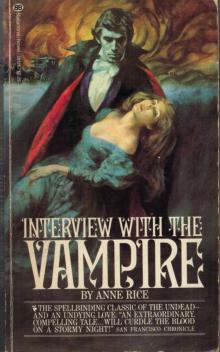 Interview with the Vampire
Interview with the Vampire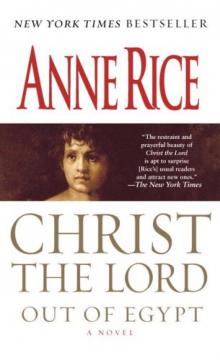 Christ the Lord: Out of Egypt
Christ the Lord: Out of Egypt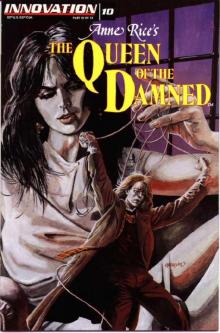 The Queen Of The Damned
The Queen Of The Damned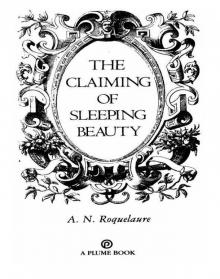 The Claiming of Sleeping Beauty
The Claiming of Sleeping Beauty Prince Lestat
Prince Lestat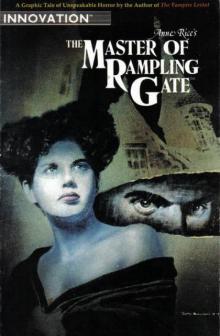 The Master of Rampling Gate
The Master of Rampling Gate The Vampire Lestat
The Vampire Lestat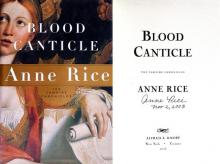 Blood Canticle
Blood Canticle Beauty's Release
Beauty's Release Pandora
Pandora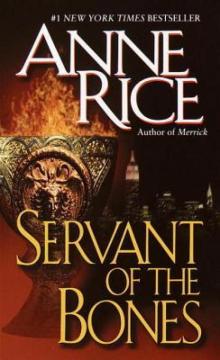 Servant of the Bones
Servant of the Bones Of Love and Evil
Of Love and Evil Beauty's Punishment
Beauty's Punishment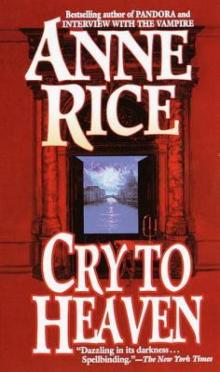 Cry to Heaven
Cry to Heaven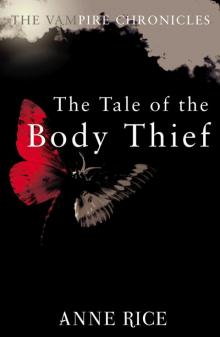 The Tale of the Body Thief
The Tale of the Body Thief The Witching Hour
The Witching Hour Memnoch the Devil
Memnoch the Devil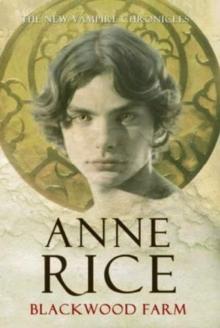 Blackwood Farm
Blackwood Farm Beauty's Kingdom
Beauty's Kingdom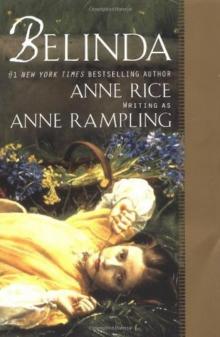 Belinda
Belinda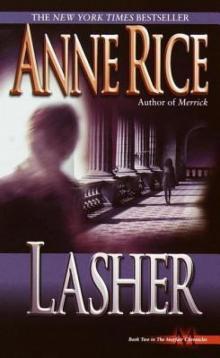 Lasher
Lasher Vittorio, the Vampire
Vittorio, the Vampire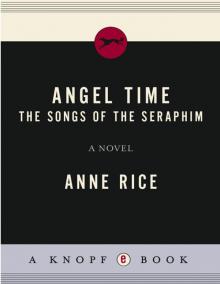 Angel Time
Angel Time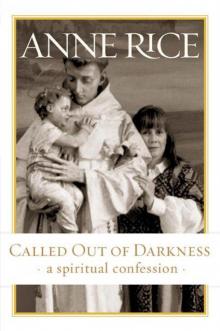 Called Out of Darkness: A Spiritual Confession
Called Out of Darkness: A Spiritual Confession Blood And Gold
Blood And Gold The Passion of Cleopatra
The Passion of Cleopatra Taltos
Taltos Exit to Eden
Exit to Eden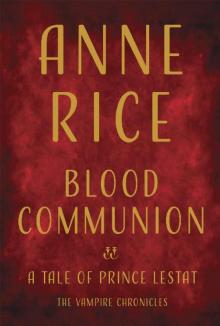 Blood Communion (The Vampire Chronicles #13)
Blood Communion (The Vampire Chronicles #13) The Wolf Gift
The Wolf Gift The Wolves of Midwinter
The Wolves of Midwinter Prince Lestat and the Realms of Atlantis
Prince Lestat and the Realms of Atlantis The Ultimate Undead
The Ultimate Undead The Vampire Lestat tvc-2
The Vampire Lestat tvc-2 The Road to Cana
The Road to Cana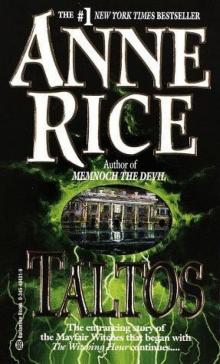 Taltos lotmw-3
Taltos lotmw-3 Merrick tvc-7
Merrick tvc-7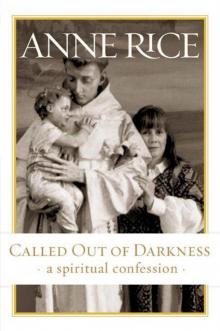 Called Out of Darkness
Called Out of Darkness Pandora - New Vampires 01
Pandora - New Vampires 01 Bllod and Gold
Bllod and Gold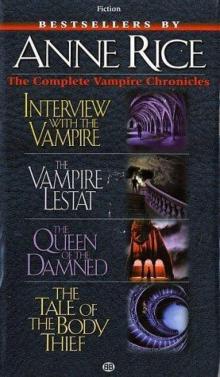 The Queen Of the Damned: Vampire Chronicles
The Queen Of the Damned: Vampire Chronicles The Sleeping Beauty Trilogy
The Sleeping Beauty Trilogy The Claiming of Sleeping Beauty b-1
The Claiming of Sleeping Beauty b-1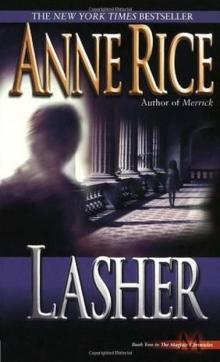 Lasher lotmw-2
Lasher lotmw-2 The Tale of the Body Thief tvc-4
The Tale of the Body Thief tvc-4 The Vampire Chronicles Collection
The Vampire Chronicles Collection Ramses the Damned
Ramses the Damned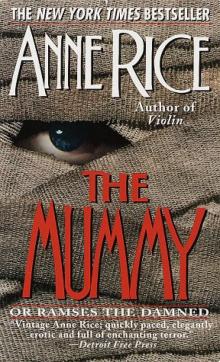 The Mummy - or Ramses the Damned
The Mummy - or Ramses the Damned Vittorio, The Vampire - New Vampires 02
Vittorio, The Vampire - New Vampires 02 The Vampire Armand tvc-6
The Vampire Armand tvc-6 Queen of the Damned tvc-3
Queen of the Damned tvc-3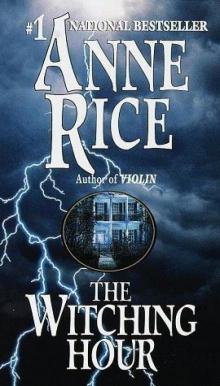 The witching hour lotmw-1
The witching hour lotmw-1 Feast of All Saints
Feast of All Saints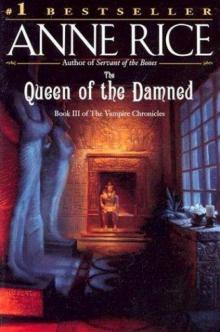 Queen of the Damned
Queen of the Damned The Wolves of Midwinter twgc-2
The Wolves of Midwinter twgc-2 The Mummy
The Mummy Blood and Gold tvc-8
Blood and Gold tvc-8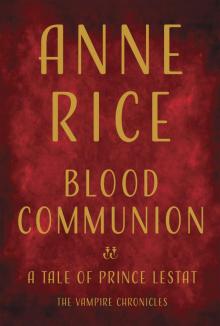 Blood Communion
Blood Communion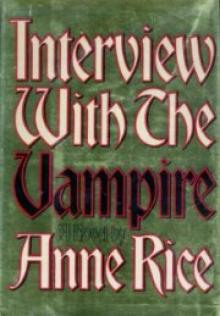 Interview with the Vampire tvc-1
Interview with the Vampire tvc-1 Prince Lestat: The Vampire Chronicles
Prince Lestat: The Vampire Chronicles